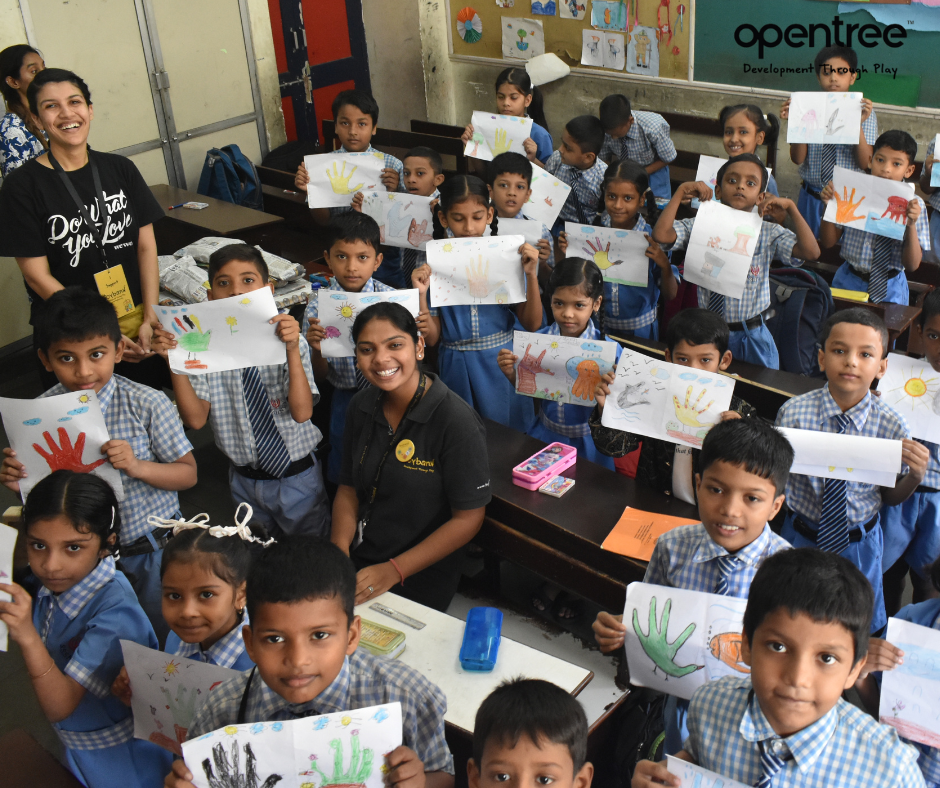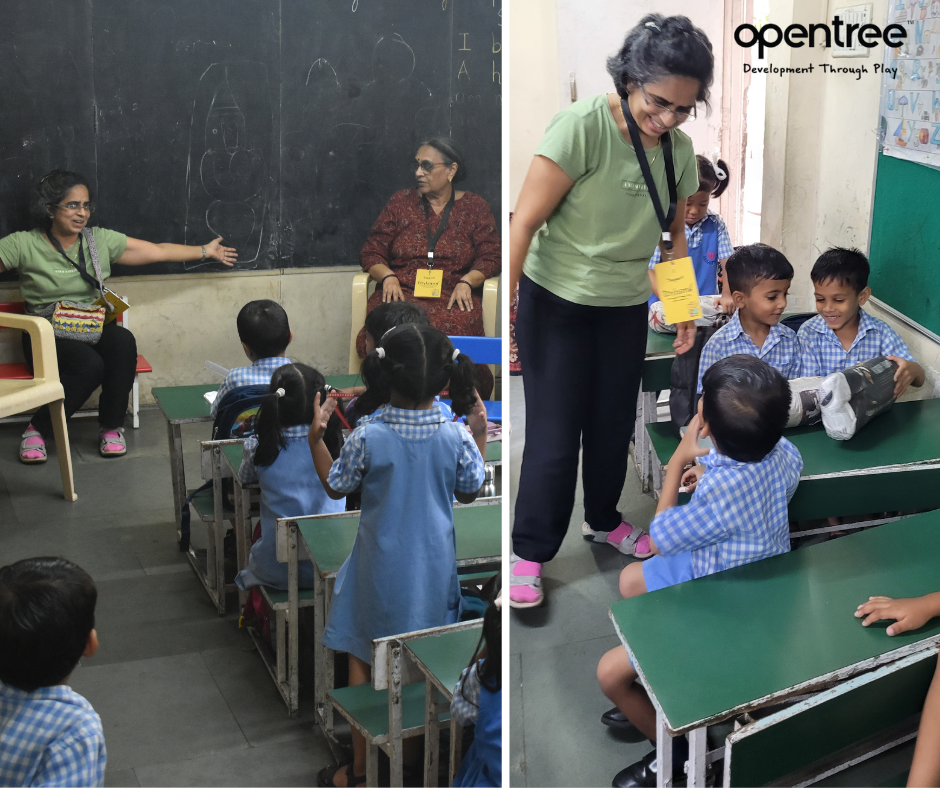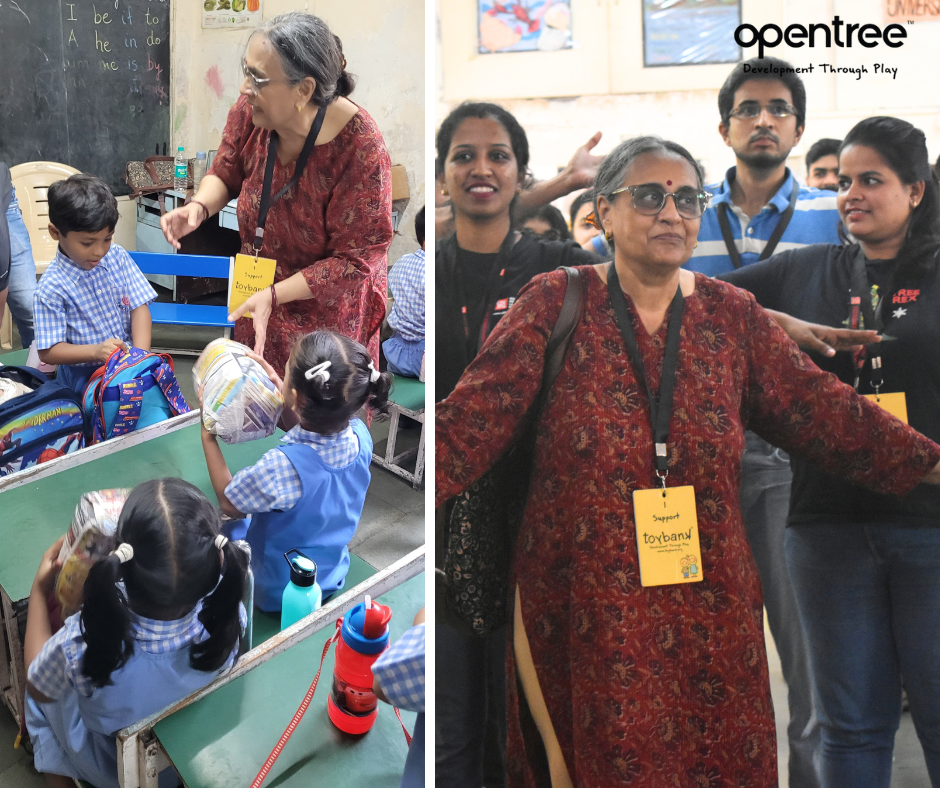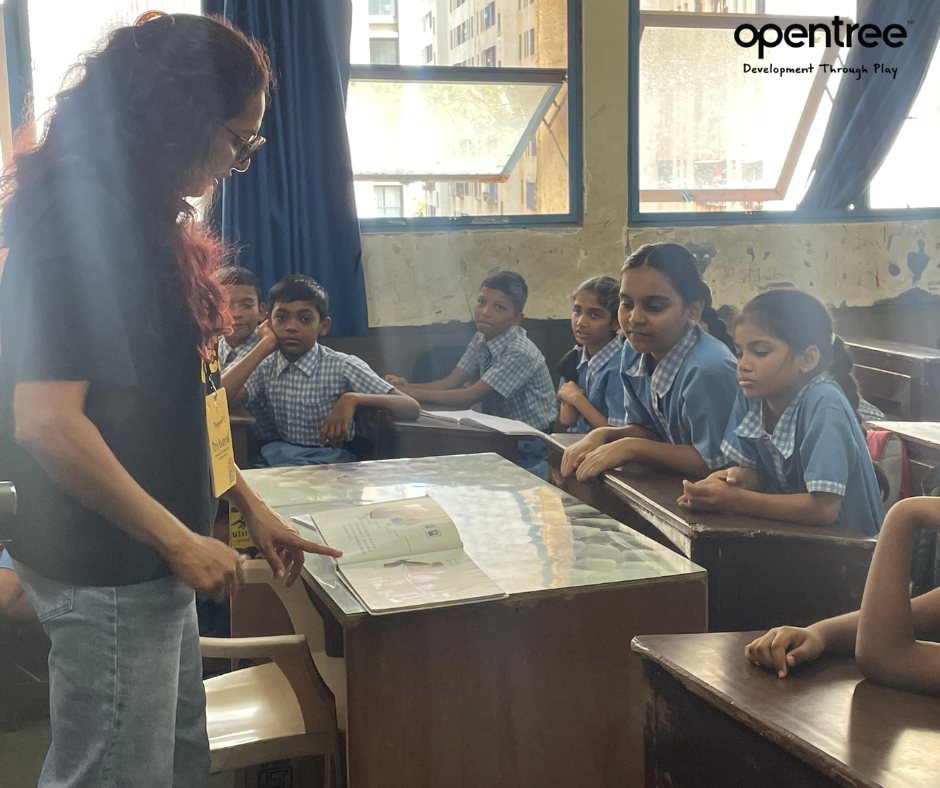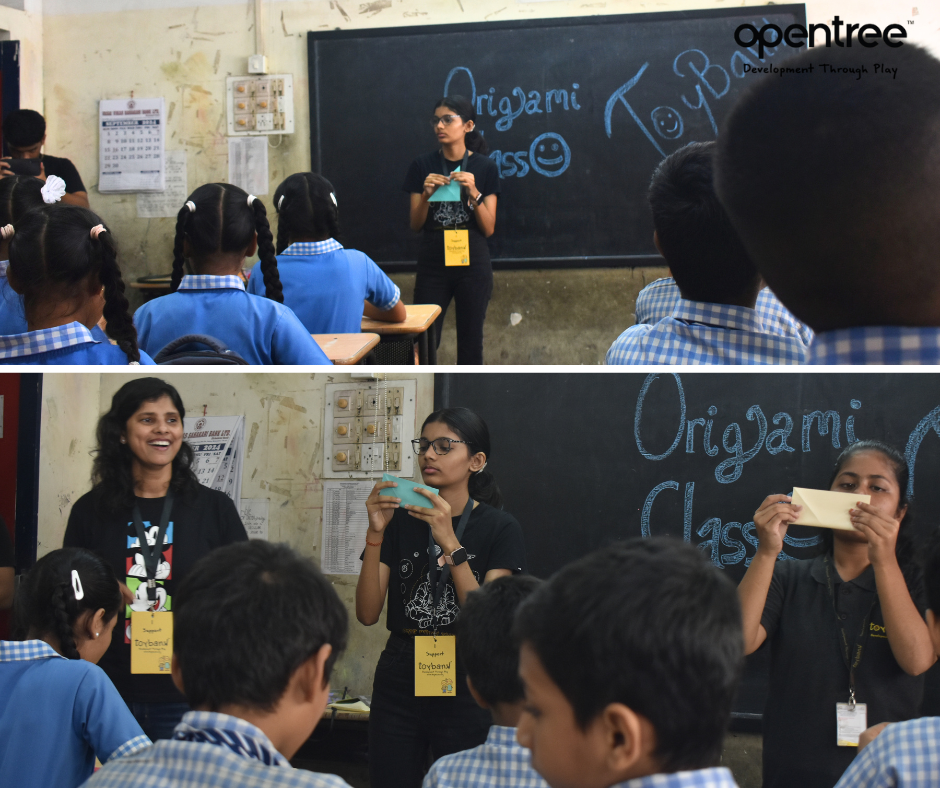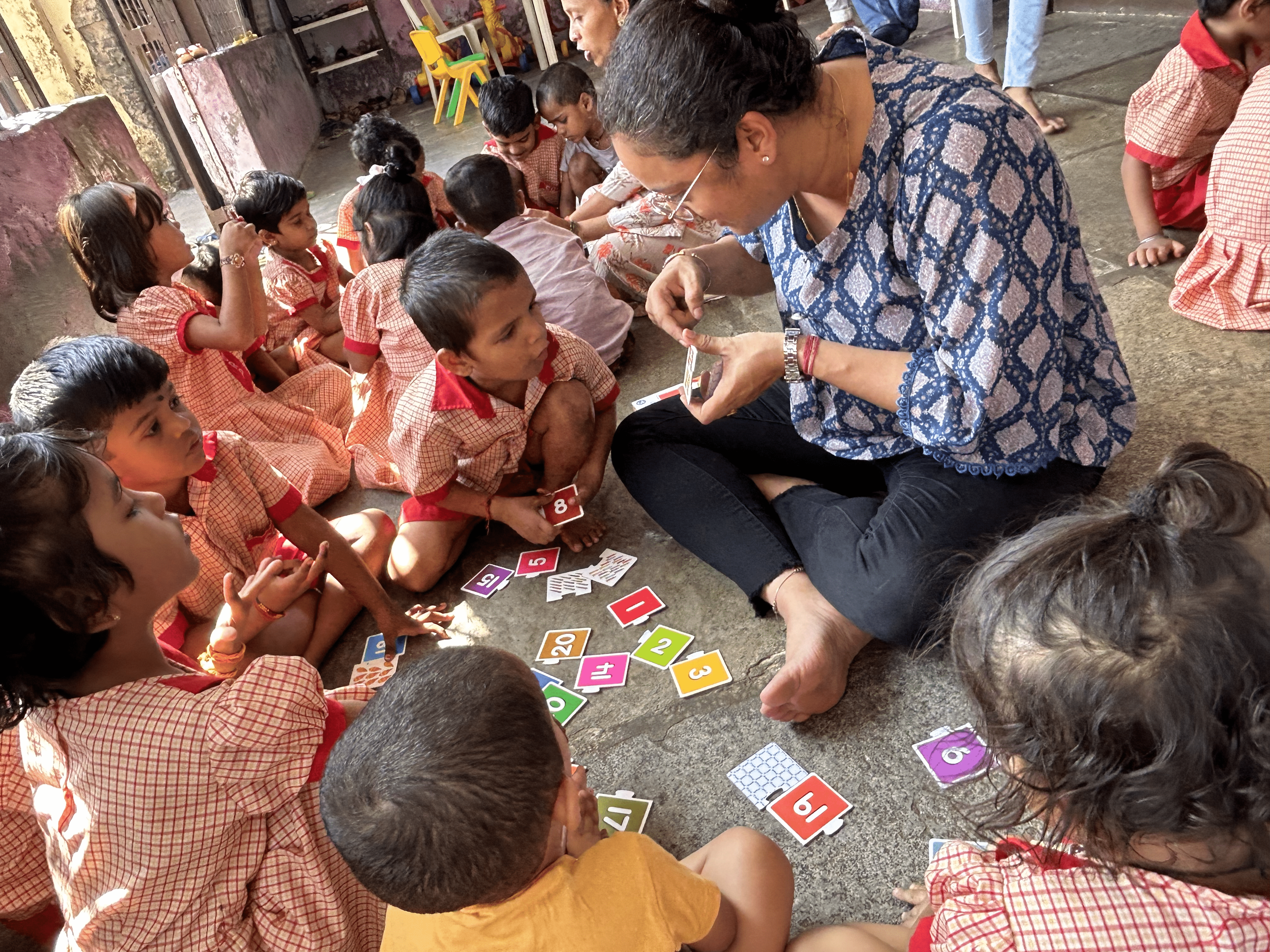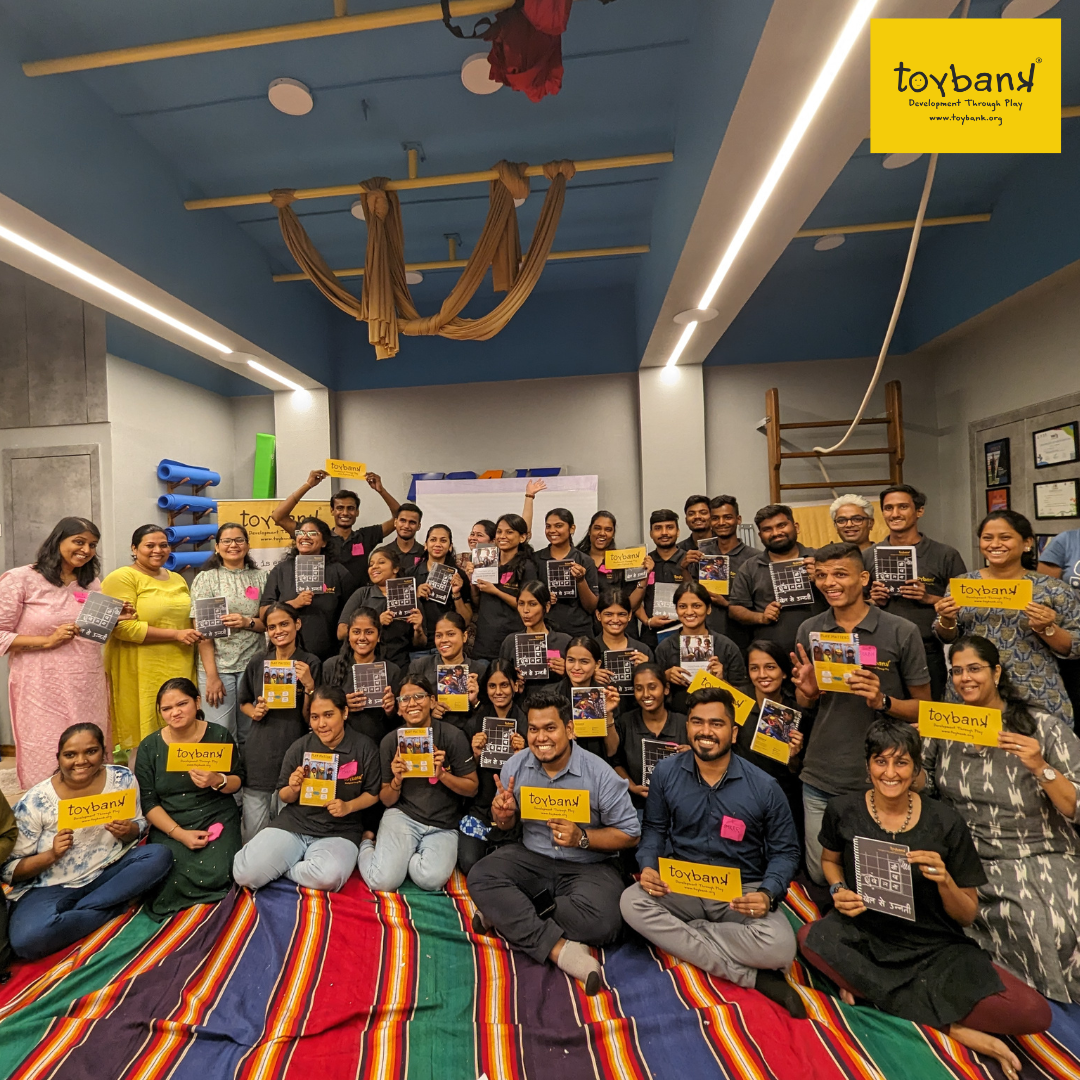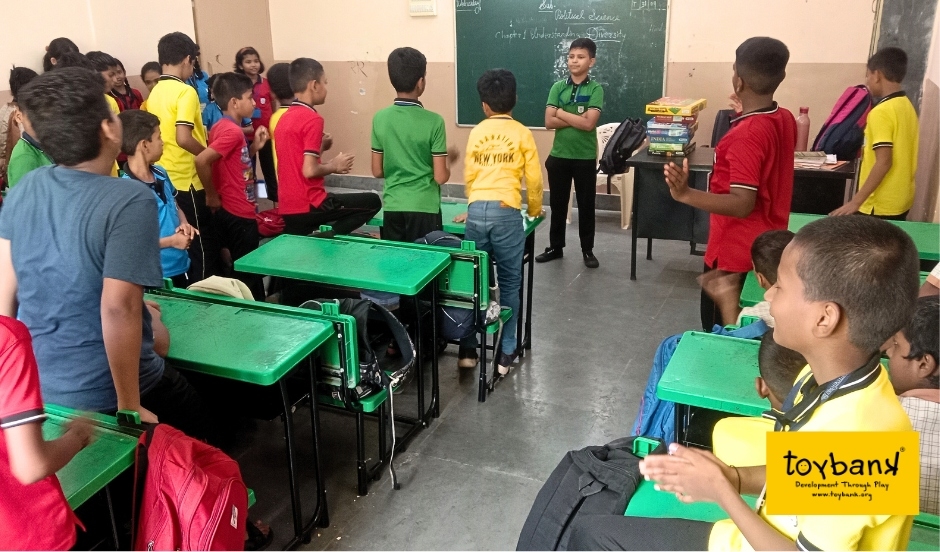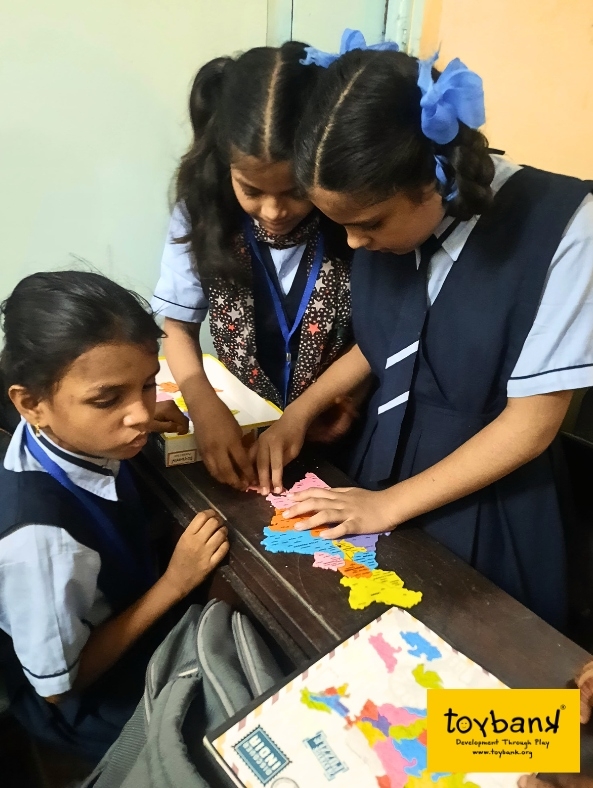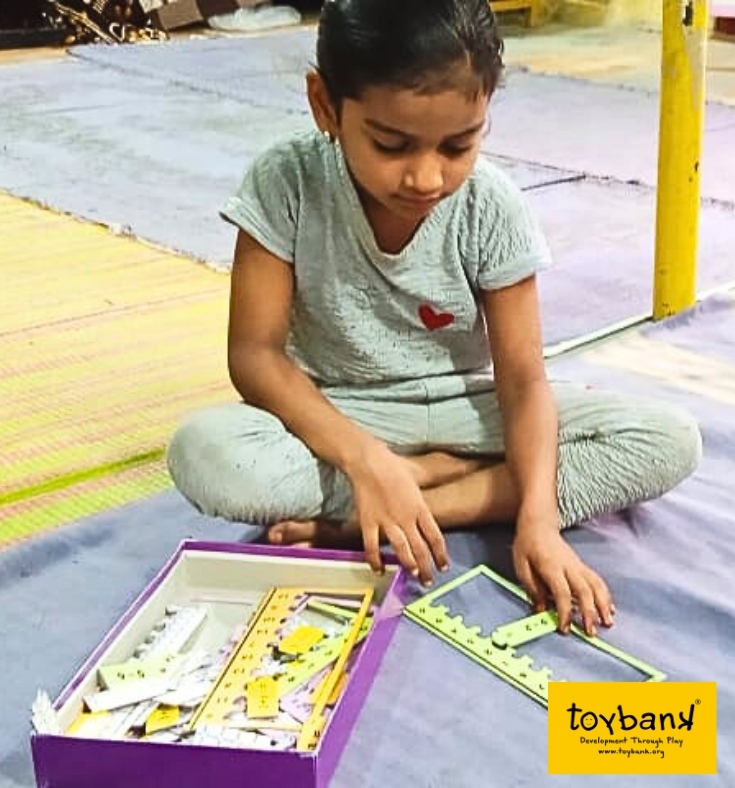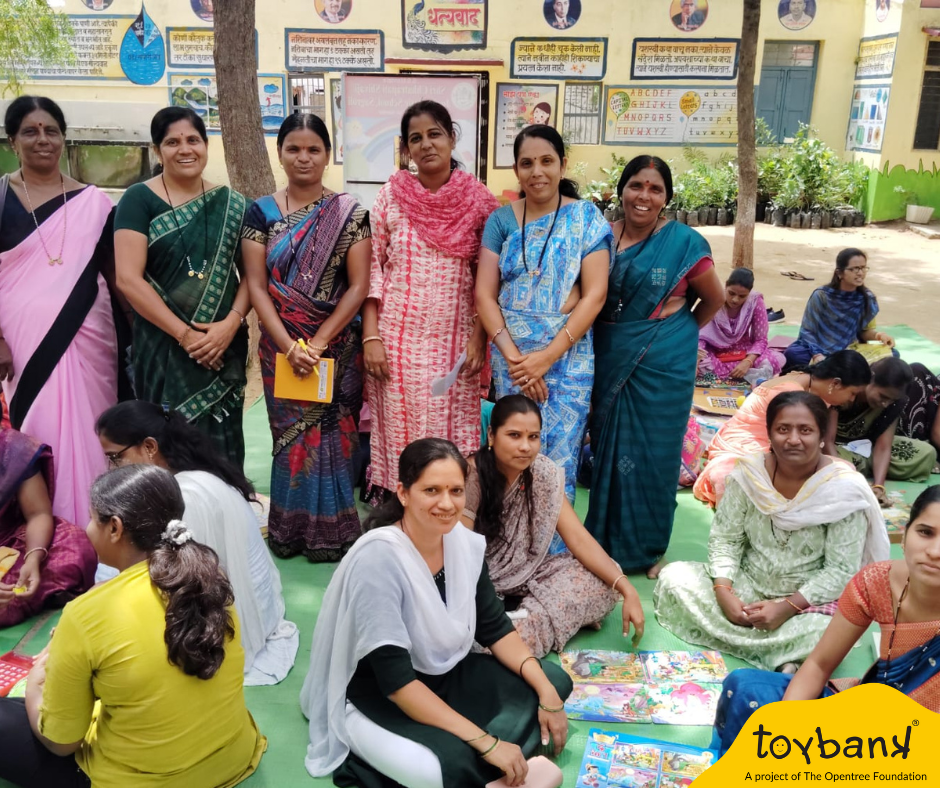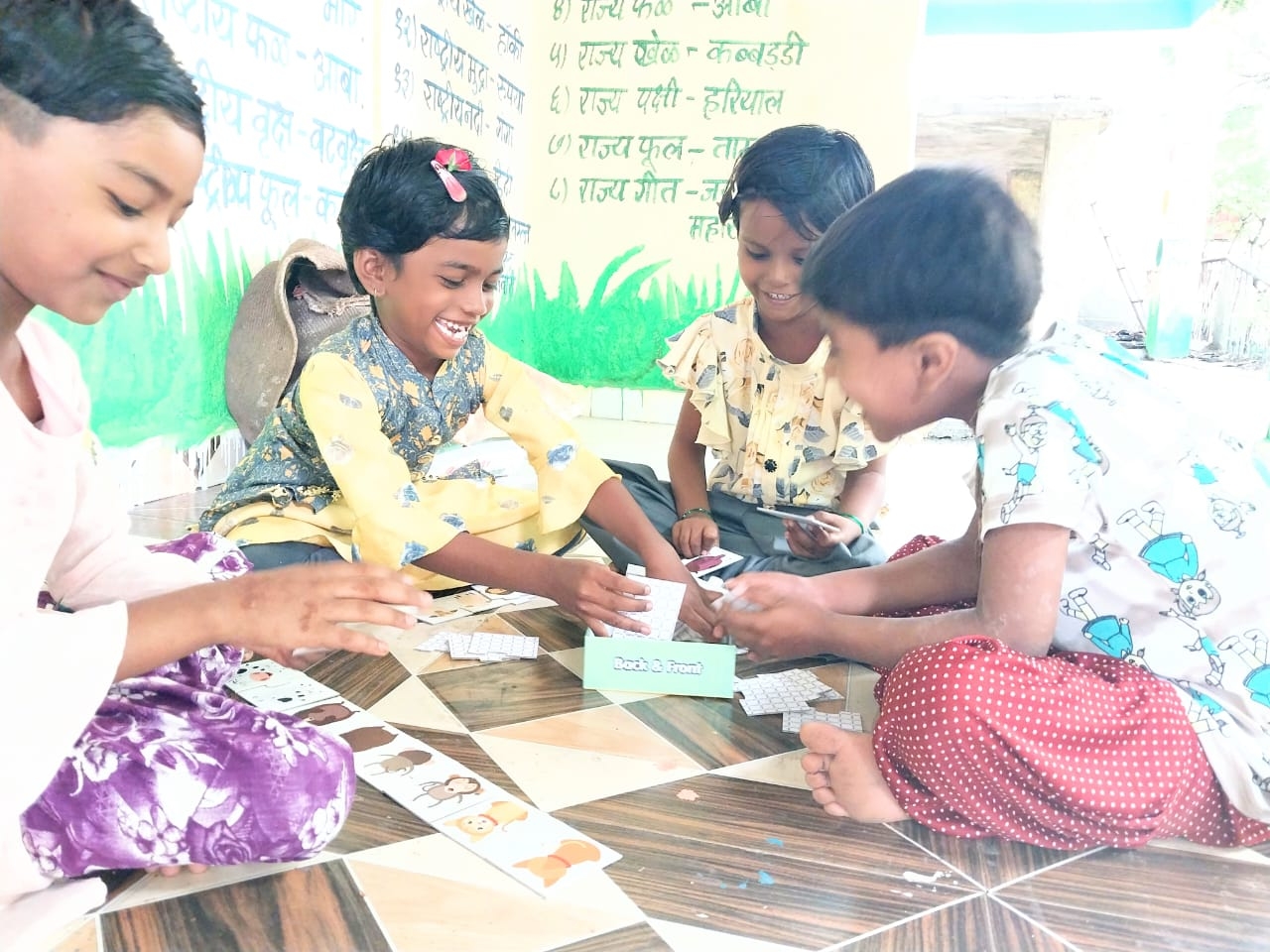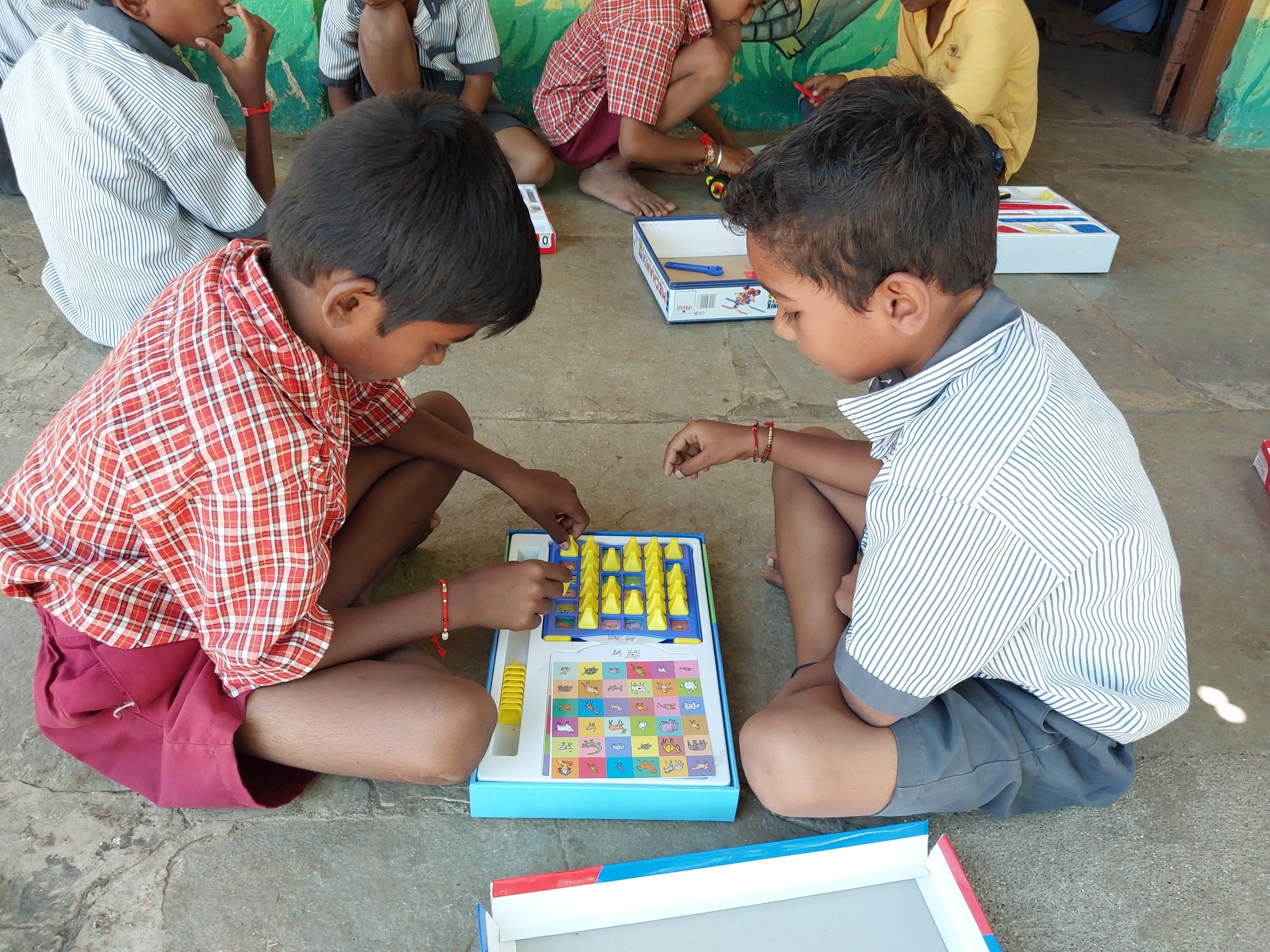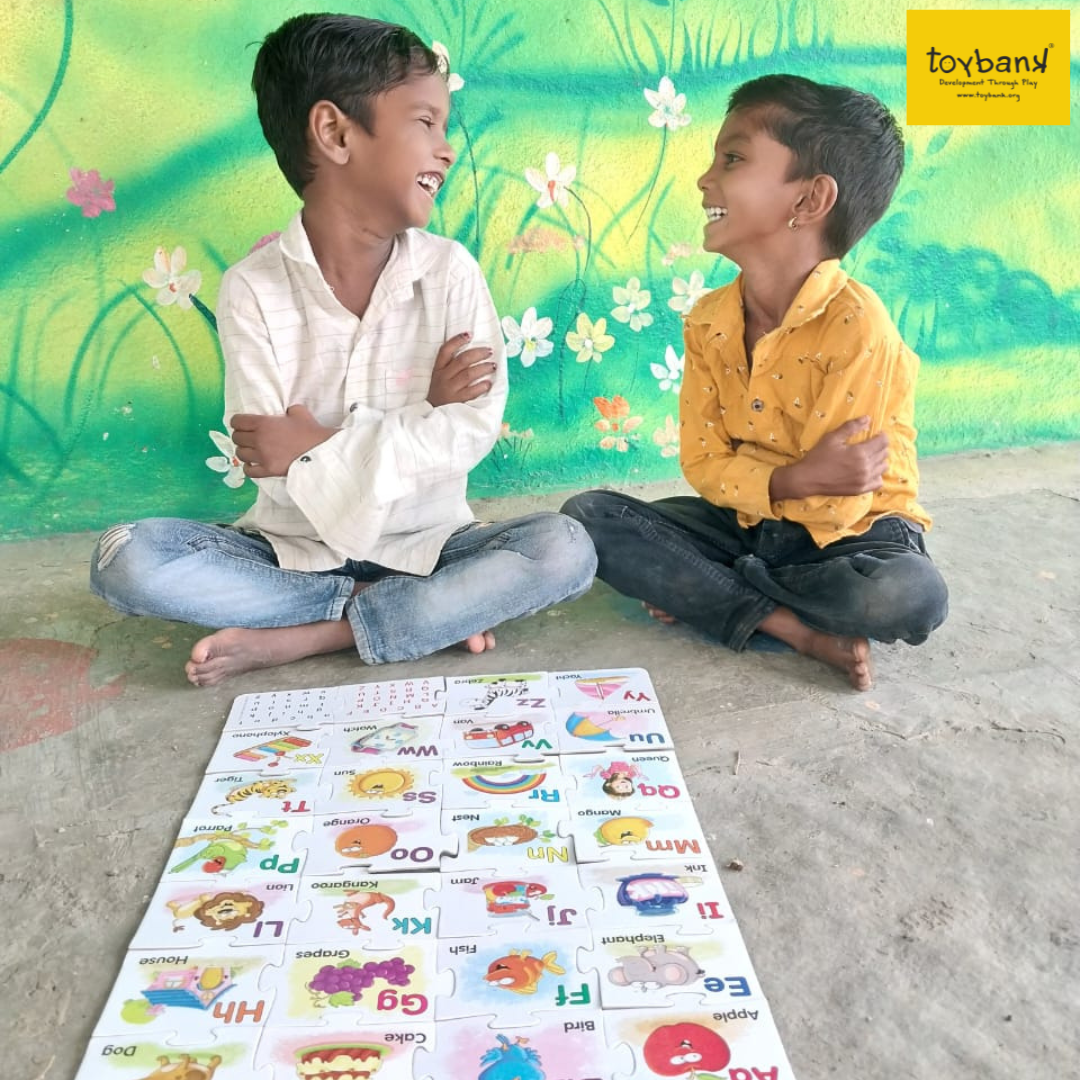‘Play is an integral part of growing up’: What our volunteers have to say
“I got an opportunity to interact with children at schools and community centres and learned how play encouraged curiosity and exploration. Their cheerfulness and the smile on their faces when they could figure out the games provided to them truly brought joy to me as a volunteer. It was an outlet for them to understand and express their emotions and also relax and recharge with the group activities. These play sessions definitely provide a holistic approach to child development and their well being and I was glad to be a part of it.”
Anisha Nagrecha, a volunteer at TOF
“I recently had the opportunity to attend and participate in play sessions conducted by The Opentree Foundation for pre-primary and primary children in government schools. I began the session as an observer, but soon got actively involved with the children. It was hard not to! The enthusiasm of the children was infectious. It was clear that they looked forward to such sessions and it was wonderful to see them apply their minds to solve puzzles, build things and figure out how to work as a team. I strongly believe that play is an integral part of growing up and the sessions conducted clearly demonstrated how much joy and value it was bringing to the children. My favourite moments were when something clicked in the child’s mind to solve the puzzle at hand and how these simple games brought them together. I think TOF has taken a step in the right direction and is making a difference in childrens’ lives.”
Devina Malik, a volunteer at TOF
‘Playworker workshops help us make classrooms more playful’
The workshop helped shape my perspective that every child is equal and has the right to play, and it is our responsibility to ensure that play remains an essential component in every child’s life.
In a four-day workshop conducted for The Opentree Foundation’s Outreach Play Workers (OPWs), we spoke about what play is, why we focus on it, how we can make classrooms more playful and joyful for children, the importance of child protection policies and more.
Earlier in March, 30 OPWs came together to learn more about the importance of play and what it means to be playful. One of our OPWs, Gausiya Mansuri, narrates her experience:
The Play Worker Unnati Series workshop was conducted over four days and was full of activities with a lively atmosphere. Its main takeaway for me was understanding the distinction between being childlike and being childish; and how play improves life skills in children. We work with children on a daily basis so it is important for us to know these components.
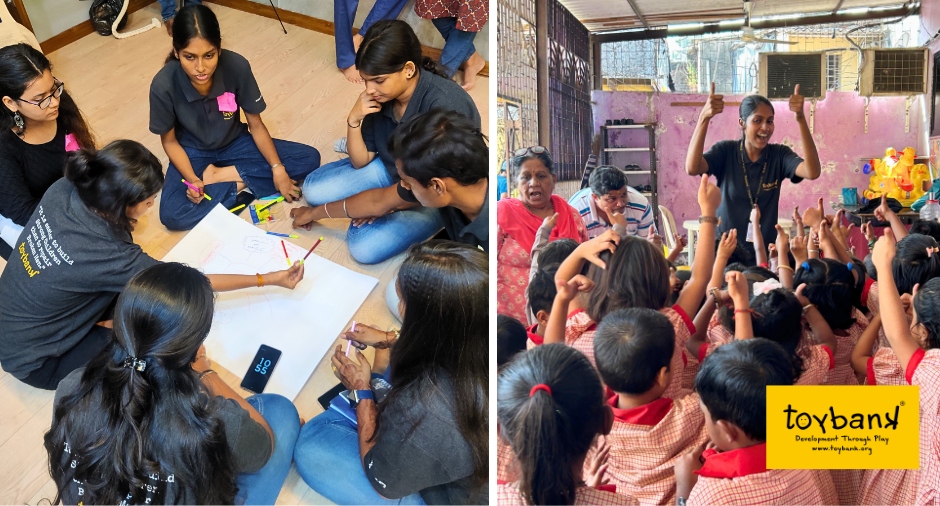
I’ve been a play worker for over a year now and the workshop allowed me to comprehend the meaning of being a playworker and internalised its essential value throughout the course. It helped me discover new activities and different ways to interact with children. It helped shape my perspective that every child is equal and has the right to play, and it is our responsibility to ensure that play remains an essential component in every child’s life.
The workshops are aimed at helping us understand how play impacts a child’s life on a daily basis and our role in creating safe and playful spaces for children; how learning happens subconsciously by children through these playful approaches.
For me, play promotes both mental and physical wellness. It helps develop a variety of skills, including communication, leadership, and time management, and that is exactly what I want to inculcate in children through our play sessions. These workshops also enable us to interact with other OPWs, and learn about their ideas and ways of managing classrooms.

In addition, it’s always beneficial to revisit the child protection policies, as it focuses on how we should interact with children, while keeping their rights at the centre of everything we do. This time, we also had a Communications training, which helped us understand the importance of communication, how to communicate with different stakeholders and what are the right ways to conduct ourselves when talking to these stakeholders, including teachers and principals.
Inspired by sessions, Class 7 student incorporates play during free periods
Rohit (name changed) is a Class 7 student and attends the MPS CBSE Aziz Baug School in Chembur, Mumbai. He is also the class monitor, who helps maintain discipline when the teacher steps out.
According to Rohit’s peers, he was known for being critical as a monitor and he was also very strict. If he saw someone briefly talking, he would write their names for a remark. This caused the class to feel distant from him and they were annoyed about the constant complaints.
Rohit, too, realised this and decided that he would work on it. The class had been attending play sessions for a while. When Rohit noticed how play could effectively captivate the class and bring joy to everyone, he decided to incorporate similar activities that he learned during the sessions. One day, while he was monitoring the class, he decided to enquire if the class was interested in playing a game involving counting numbers, and all eagerly agreed. He kept directing the activity and discovered that he no longer had to be a supervisor. He was surprised by his classmates’ interest in the new method of engaging with each other. This went on for a few weeks during free periods.
When the class was questioned about their perception of Rohit, they said that they enjoyed participating in play while being monitored, as it brought them more joy, and they liked that Rohit took the effort to make the classroom more playful for them.
Even as a Class 7 student, Rohit, who was inspired by play sessions, understood that play itself could help him better connect with his peers. He was able to understand how to engage children and how to channel their energy positively so as to maintain discipline in class.
Class 5 students develop collaboration skills through play
Research shows that play has a transformative impact on children’s holistic growth, equipping them with the skills and mindsets needed to grow into well-rounded adults in an ever-changing, increasingly volatile and uncertain world. At Toybank – Development through Play, we are committed to building critical life skills in at-risk children by increasing their access to play.
In one of the play sessions at the Maharashtra Vidyalaya school in Mankhurd, our Outreach Play Worker (OPW) observed that a group of three girls would not interact with anyone in class. They are all 11-years-old and studying in Class 5.
In order to get them to interact with the other classmates, the OPW introduced them to games that would help them develop collaboration skills. The board games included puzzles of the Solar System and India Map, numeric games such as Multiplication, Tic-Tac-Toe and strategy-based games such as African Safari and Othello. All of these games require them to play in groups and interact with others.
When children play in groups, they are encouraged to collaborate, communicate and share ideas with each other. This strategy helps in developing social skills, problem-solving abilities and teamwork. The OPW had learned about this during one of the workshops we organised and decided to use the same strategy with this group.
This helped the group gain confidence to talk and play with the others in class and, while having developed essential life skills. In conversation with the OPW, the teacher spoke about how play sessions have been benefiting children and also helping with their mental well-being.
Play helps Class 2 student build confidence, improve language skills
Divya is a Class 2 student, who lives in Maharashtra’s Ahmednagar district in a joint family. Her Mother is a domestic worker, while her father and uncle work as labourers. The children Toybank – Development through Play works with come from vulnerable communities and do not have access to quality play.
When Divya first came to the Bal Bhavan, she did not want to sit in class and was afraid to interact with other students. She would often cry when brought to the Bal Bhavan. In the ‘Power of Play’ workshops the teachers attended, they were told about using play to strengthen the student-teacher bond and how to effectively use play in their classrooms. When the teacher noticed that Divya was being hesitant to sit in class, she introduced her to board games and started playing with her.
Eventually, Divya got comfortable and began attending the Bal Bhavan regularly. When she moved to a higher grade in the following year, she struggled with reading, writing and speaking, and was not very confident. To help her, the teachers began playing games such as fruit flash cards, which help with visual recognition, memory, and also used games based on letter recognition, language and vocabulary and spelling building.
They played these games daily and the teachers noticed improvements in her. Divya also started finding it fairly easier to read and spell words, eventually leading to improved skills. She began sitting with her classmates and they began competing to learn better, while ensuring that they helped each other. Learning through play made learning fun and easy for Divya, which led her to top her class in her exams.
Research shows that play has a transformative impact on children’s holistic growth, equipping them with the skills and mindsets needed to grow into well-rounded adults in an ever-changing, increasingly volatile and uncertain world. At Toybank, we are committed to building critical life skills in at-risk children by increasing their access to play.
Mothers, play and participation: A story from rural Maharashtra
This competition was a reminder to not let play disappear from our lives.
Parents play a pivotal role in children’s development. Yet, not many parents have the leisure of playing, in particular Mothers, given the burden of domestic responsibilities and gendered social norms.
However, play is and should be for everyone. From improving parent-child and teacher-student bonds, creating fear-free, safe spaces for conversation to bringing respite from the stress of everyday life, there are endless benefits of play for adults and children. Earlier in March, the United Nations declared June 11 as the International Day of Play in efforts to preserve, promote, and prioritise play so that all people, especially children, can reap the rewards and thrive to their full potential.
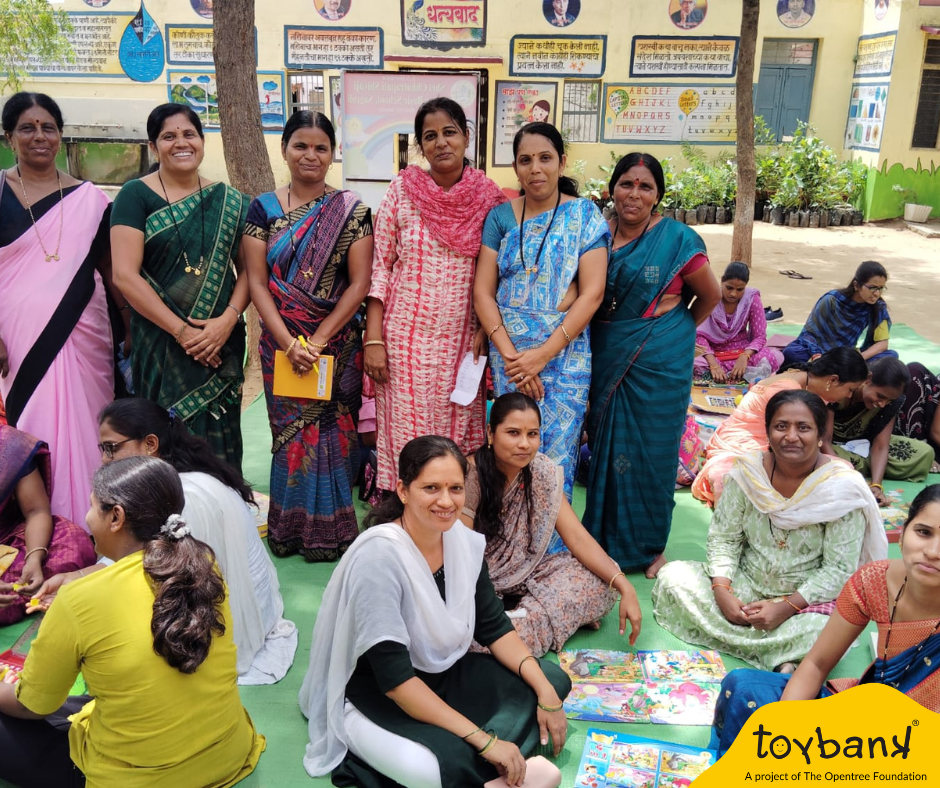
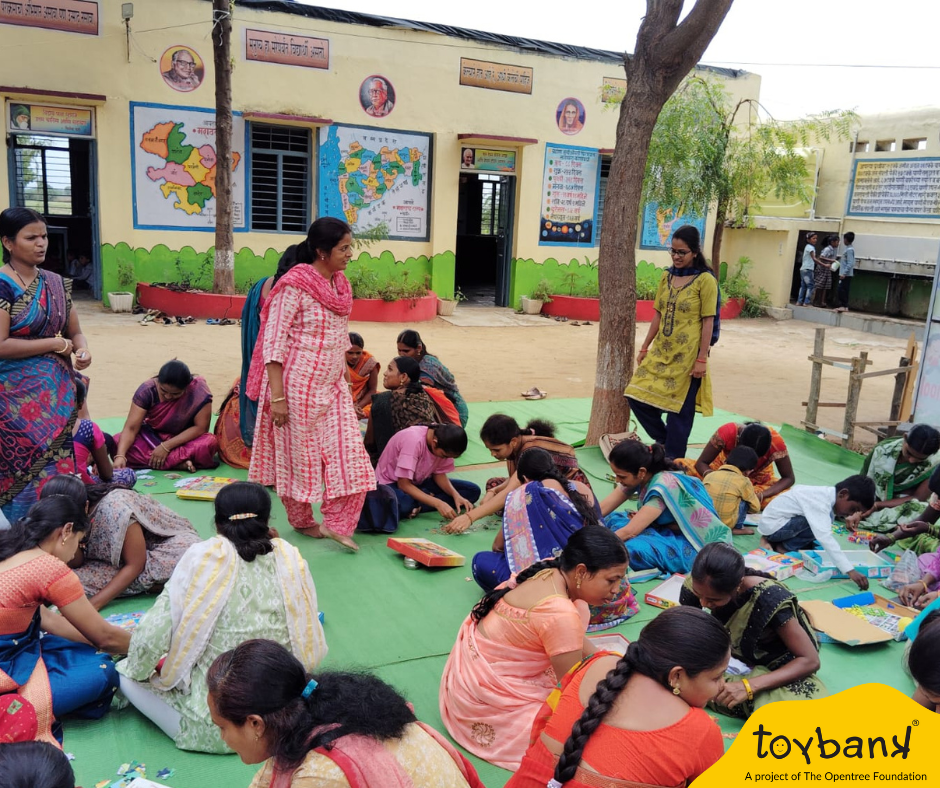
To celebrate this, on June 20, a school in Sagroli village, near Maharashtra’s Nanded district decided to use play to create a safe, joyful and empowering space for Mothers, who are often hesitant to participate in parent-teacher meetings. The teachers of the primary school invited their students’ mothers to a day of play.
The Opentree Foundation’s flagship project, Toybank – Development through Play, has had a play centre at this school for years, as part of our long-standing partnership with the Sanskriti Samvardhan Mandal (SSM), an organisation dedicated to the holistic development of rural communities through impactful interventions in Education, Skill & Livelihood, Agriculture, and Environmental Conservation.
The school organised a competition for Mothers using some of the games from Toybank’s play programmes. While some Mothers enjoyed competing with one another to see who would complete the puzzles first, the others used their creativity and imagination to build different things using blocks. There was a sense of excitement, curiosity, joy and community, as these mothers played with child-like excitement, participated with enthusiasm, and for a few hours, forgot about chores and responsibilities.
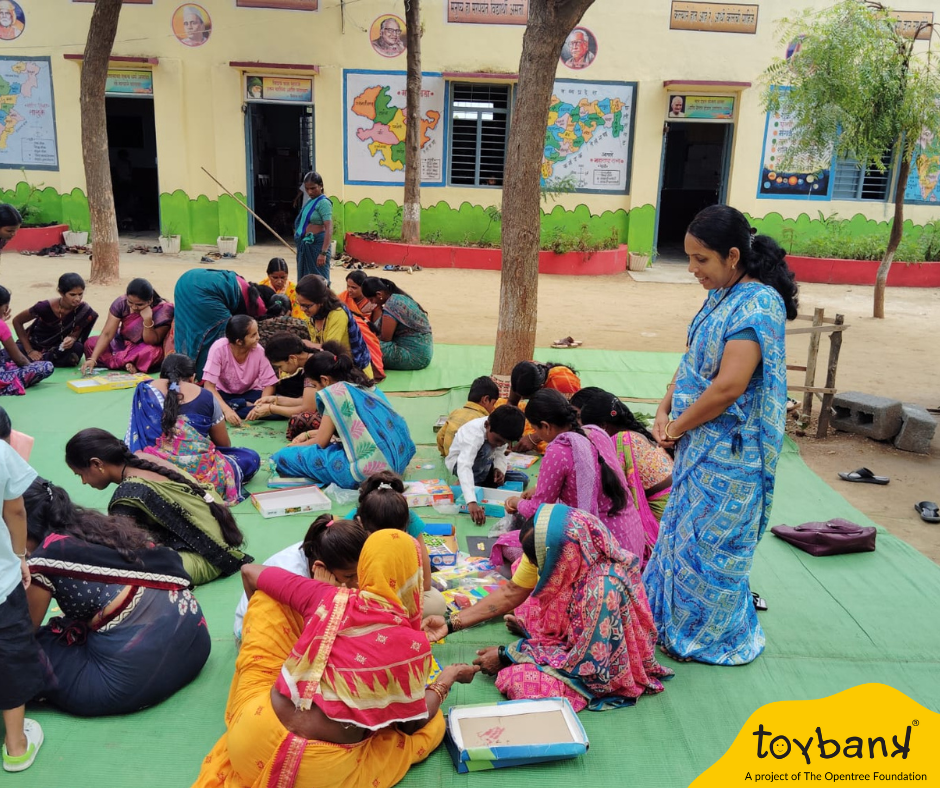
The day ended with all Mothers receiving a sapling as a prize for their enthusiasm and participation, and a request to the school’s parent-teacher committee to organise such play sessions regularly, for both mothers and fathers. As one of the parents put it, “this competition was a reminder to not let play disappear from our lives”, which truly underscores just how important play is in this world, for both adults and children.
Experiences like these are a powerful testimony to the transformative Power of Play. When educators and parents are empowered with play, they use it to make this world a better place for themselves, and for children, something we have strived to do for the past 20 years.
Class 5 students develop collaboration skills through play
Research shows that play has a transformative impact on children’s holistic growth, equipping them with the skills and mindsets needed to grow into well-rounded adults in an ever-changing, increasingly volatile and uncertain world. At Toybank – Development through Play, we are committed to building critical life skills in at-risk children by increasing their access to play.
In one of the play sessions at the Maharashtra Vidyalaya school in Mankhurd, our Outreach Play Worker (OPW) observed that a group of three girls would not interact with anyone in class. They are all 11-years-old and studying in Class 5.
In order to get them to interact with the other classmates, the OPW introduced them to games that would help them develop collaboration skills. The board games included puzzles of the Solar System and India Map, numeric games such as Multiplication, Tic-Tac-Toe and strategy-based games such as African Safari and Othello. All of these games require them to play in groups and interact with others.
When children play in groups, they are encouraged to collaborate, communicate and share ideas with each other. This strategy helps in developing social skills, problem-solving abilities and teamwork. The OPW had learned about this during one of the workshops we organised and decided to use the same strategy with this group.
This helped the group gain confidence to talk and play with the others in class and, while having developed essential life skills. In conversation with the OPW, the teacher spoke about how play sessions have been benefiting children and also helping with their mental well-being.
Play sessions let me witness growth in children, says Grade 11 volunteer
While we have always been exposed to play as a fundamental need in our lives, children from vulnerable communities lack this approach.
It has been a huge learning and an incredible experience to witness the impact of play in the lives of children from marginalised communities, during my internship with The Opentree Foundation.
The organisation conducts play sessions through its flagship project: Toybank — Development through Play, with its 623+ play centres set up in 339 government schools of Maharashtra. The play sessions begin with fun activities for the children as a group, to set the momentum for the rest of the session. It’s also a way for children to unwind and take a break from their ongoing classes.
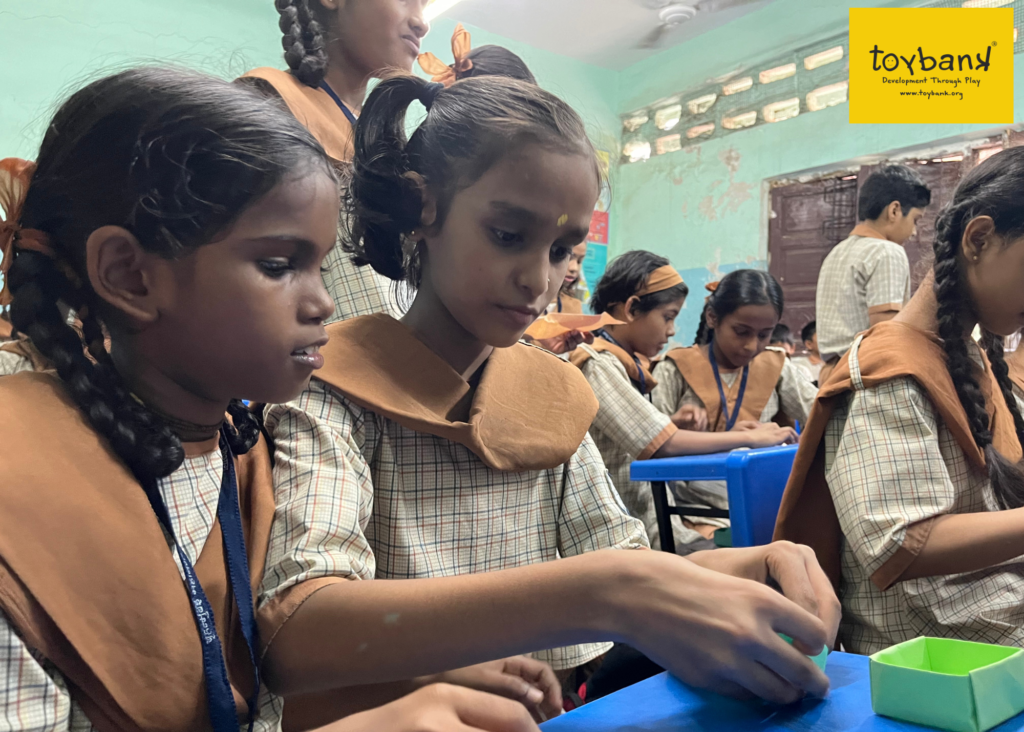
Games that involve multiplication, reading the time, chess, and multiple others are then brought out for children. I noticed that these games varied in complexity and catered to every child in the room. As a volunteer, I attempted to play all games with the children. Teaching them how to tell the time, counting numbers up to 20 with them, and taking part in multiple other groups were just some of the activities I was a part of over a span of three weeks.
While we have always been exposed to play as a fundamental need in our lives, children from vulnerable communities lack this approach. Interning with TOF allowed me to witness how play helps these children develop essential life skills. Through the multiple play sessions I attended, I was able to witness growth in children, including basic Math skills, social skills and improvement in some of their language skills.
In addition to this, on the International Day of Play, I got the opportunity to co-host an Instagram LIVE with chief play people, including Robyn Monro Miller, President of the International Play Association; Marguerite Hunter Blair, CEO, Play Scotland and Shweta Chari, CEO & Co-founder, TOF. The conversation included discussions around what can be done to make the world more playful for our children and what can we as young people do to advocate for play. It not only allowed me to understand how play is perceived at a global level, but also helped me understand the need for the Right to Play in India.
Aarush Kamdar is a Grade 11 student, former intern at TOF and now a play volunteer.
Volunteer Speaks: ‘Play is a fundamental right, every child must have access to quality play’
Every child deserves the Right to Play as a fundamental part of their upbringing. Let us all advocate for playful growing years for every child in India.
We were at my child’s annual school fest; and my little one felt overwhelmed by the noise and choices around. So, we decided to take a walk around to see if we could find something of her interest and we stumbled upon The Opentree Foundation’s (TOF) stall, where welcoming smiles caught her attention. While she immersed herself in board games and the volunteers engaged her, I learned about the organisation.
The Opentree Foundation is a Mumbai-based non-profit, founded in 2004, with Toybank — Development through Play as its flagship project. Their mission instantly resonated with me. Working with a play space design firm and being part of a family of play enthusiasts, I understand and appreciate the Power of Play. But, what truly captivated me was the foundation’s use of play to enrich lives. They nurture children to become strong individuals, promote open-mindedness, and impart vital life lessons through play, all in a structured and impactful way.
Play is integral to our lives, a cherished part of our family routine, it is a basic right. However, for many children quality play is a privilege. This realisation led to me volunteering with TOF.
Volunteering with the organisation has helped me:
Share the joy of play: Bring in my energy, excitement, perspective, experience in the play sessions and impart some impromptu learning led by the games or interactions we have.
Belief in the cause: After I spoke to the co-founder, Shweta Chari, and heard the emotion and conviction she had towards making Right to Play a reality for every child in India, I knew I wanted to contribute.
Playful living: Play does not need to be a chore or an activity you indulge in for a short while in a day. Play and playfulness is a way of living a better life. I felt that volunteering with TOF would have a positive impact on my days. The thought of indulging in play with a group of children only meant: excitement, joy and fun.
So far, my volunteering experience at the foundation has been a humbling and joyful experience. The instant connection with children through play is remarkable; they play with enthusiasm and openness, embracing respect, kindness, and sharing, as that is what TOF’s play sessions promote. Most play sessions are filled with curiosity and squeals of excitement. Heartwarming moments, like them including me in their games and cheering for me, show how bonds form quickly through play. I have learned a few new games in these sessions I attended, and have played it again with my family back at home. Attending these play sessions allows me to disconnect from my regular routine and to-do lists.
Play is more than just fun. It is a necessity. It creates cherished childhood memories, teaches crucial life skills, and shapes attitudes. Every child deserves the Right to Play as a fundamental part of their upbringing. Let us all advocate for playful growing years for every child in India!
This article has been drafted by Gunjan Shenoy, a volunteer with The Opentree Foundation, talking about her experiences from attending play sessions.
If you would like to volunteer with us, please drop an email to mail@toybank.org!











